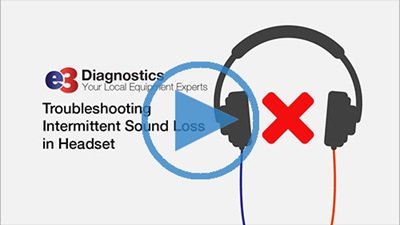Maintaining your hearing screening and diagnostic audiology equipment is important. It helps ensure accurate test results and improve the longevity of your devices. This will lead to more accurate hearing test results. Here are a few simple steps you can take to keep your audiometer in good working order:
Inspect & clean headbands and microphone
The headset is one of the most important parts of an audiometer, so it's important to inspect it regularly. If the headband is loose or if the ear cushions are cracked, replace them immediately.
It’s also important to keep the exterior clean. Be sure to use cleaning wipes that don’t contain alcohol which can crack and discolor plastics, especially ear cushions.
Don’t forget to clean and maintain your microphone as well. You can use a non-abrasive cloth to wipe away dust and debris from the mic and headband.
Check cords
In a busy clinic, cords can be easily damaged over time. If you find any kinks, fraying, or other damage, replace them immediately. It’s a great idea to keep a spare set of cords on-hand to avoid downtime.
Sound loss in your headset can be caused by either the cord or the headset itself. There are easy ways to determine which is the culprit. Check out this 30-second video to learn more and avoid an unnecessary service call.

Clean jacks
The jacks on an audiometer can get dirty over time, which can negatively affect sound quality. To clean the jacks, use a soft cloth or a disposable alcohol wipe to remove any dirt or debris. Be sure to wipe down and inspect the output jacks as well.
Replace probe tubes
The tubing used for probes and phone inserts must be replaced if it is discolored, cracked, or has debris. Never cut tubing and be sure to use silicon tubes.
Additionally, make sure you’re using the correct type of probe tubes for your specific model. This will help to ensure the accuracy of the test results. If you’re unsure, check out our easy search filter HERE.
Keep your audiometer safe
Avoid exposing your audiometer to extreme temperatures, dust, or humidity. Regularly inspect the device for any signs of damage, such as cracks or loose wires. Make sure all the buttons on the audiometer are functioning properly and the volume control is working correctly. If you notice any issues, contact a qualified technician for repair or replacement as soon as possible..
Of course, having your audiometer calibrated regularly by a qualified technician is the most fundamental step to accurate results!
Calibration FAQ’s
● What is calibration?
Calibration is the process of ensuring that an instrument is accurate. In the case of screening and diagnostic audiometers, calibration ensures that the device is producing accurate sound levels.
● What happens if an audiometer is not calibrated?
The main benefit of a properly calibrated audiometer is the accuracy of hearing tests. Devices that are out of calibration can produce inaccurate hearing tests. This can lead to misdiagnosis of hearing loss, poorly fit hearing aids or cochlear implants, and non-compliance with state regulations.
● How often should audiometers be calibrated?
Audiometers should always be calibrated annually by a qualified technician.
● How do I find a qualified, local technician to calibrate my equipment?
Contact the manufacturer of your device, or search HERE.
If you haven't already, make sure to subscribe to our newsletter to keep up-to-date with our latest resources and product information.